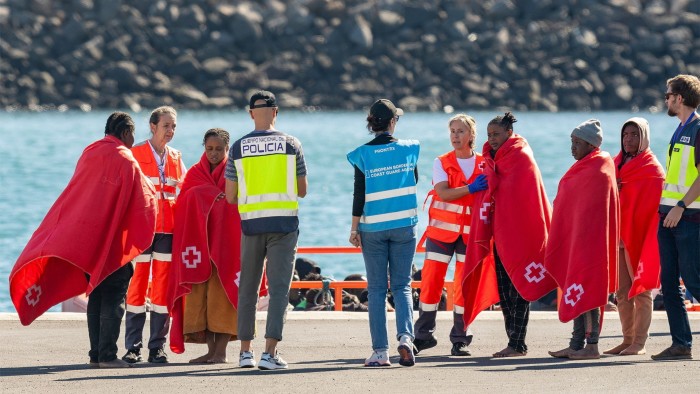Some content could not load. Check your internet connection or browser settings.
She makes the point that about 6.8mn asylum-seekers have come to Europe since 2015. More than 3.6mn have been ordered to leave — but only 1mn have actually left.
Why is this? Partly because it all depends on whether the EU has a readmission agreement with the country from which an asylum seeker comes. The EU has such accords with, for example, Albania and Georgia, but not with Afghanistan, Bangladesh or Syria.
A second problem is that, under EU rules, a government can apply to remove a rejected asylum seeker to the country in which they first entered the bloc’s border-free Schengen area. But nowadays few countries abide by these rules.
In 2023, European governments submitted almost 200,000 applications to remove people, but only 19,000 resulted in their transfer to the country where they arrived, Monn writes.
Most European states display no appetite for accepting rejected asylum-seekers. They know that there is little realistic prospect of returning them to their home country if there’s no repatriation agreement. As a result, the whole system is gummed up.
National security
For some EU states, asylum has become a matter of national security.
Poland’s government last year temporarily suspended the right to asylum, mainly to deter migrants arriving from Belarus. It is also building a wall to seal its border with its eastern neighbour.
There are good reasons for Poland’s drastic actions. Alexander Lukashenko, the pro-Russian dictator of Belarus, has sponsored people to arrive from the Middle East or Africa and encouraged them to cross the border into Poland.
Migrants and the European labour force
Even in Poland, the government’s tougher line on migrants and asylum-seekers needs to be balanced against the nation’s labour force requirements — as the FT’s Raphael Minder reported from Warsaw in November.
In 2023, Poland recorded its sixth consecutive year of population decline. One state-funded think-tank estimates that the labour market will lose 2.1mn workers by 2035.
In Germany, the independent Bertelsmann Foundation published a study last year that estimated the nation’s labour force would shrink to 41.9mn by 2040 from 46.4mn today, unless some 288,000 skilled foreign workers were admitted every year.
Giles Merritt of the Brussels-based Friends of Europe think-tank says:
Far-right populists have succeeded in inflaming voters across the EU, and now form an anti-immigrant bloc that threatens the Union itself. Member governments have generally made a hash of persuading voters that their economic interest is to rejuvenate and repopulate Europe through immigration and convince them that this far outweighs real or perceived social frictions …
Ageing Europe needs more migrants, not fewer.
The EU’s crumbling asylum pact
In private, some EU governments acknowledge Merritt’s point, but they fear the electoral consequences of saying so explicitly in public.
Instead, they are scrambling for ad hoc solutions such as “outsourcing” asylum policies, using euphemistically named “return hubs” for migrants set up outside the EU.
Kyriakos Mitsotakis, Greece’s prime minister, is among those who question whether such measures can be applied at pan-European level. Italy’s arrangements with Albania have already run into legal difficulties.
It might help if the EU could make a success of its laboriously negotiated Migration and Asylum Pact, due to come into effect next year — but already some governments are trying to unpick that agreement.
To sum up, the EU seems no closer to striking a balance between curbing irregular migration, operating effective asylum policies, keeping open legal pathways for migrant workers and persuading voters that all this amounts to a coherent plan.
The EU pact on migration and asylum — an analysis by Carmen González Enríquez for Spain’s Elcano Royal Institute
Tony’s picks of the week
Guangzhou FC, once China’s leading football club, has been dropped from the national league in the latest blow to the authorities’ hopes of achieving global success in the sport, the FT’s Thomas Hale and Gloria Li report
Jean-Marie Le Pen, who has died at the age of 96, was an unapologetic nationalist who despised the less abrasive style that has made his daughter Marine’s party the dominant force on the French right, Arthur Goldhammer writes in his Tocqueville21 blog
Recommended newsletters for you
Trade Secrets — A must-read on the changing face of international trade and globalisation. Sign up here
Chris Giles on Central Banks — Vital news and views on what central banks are thinking, inflation, interest rates and money. Sign up here
Source link : http://www.bing.com/news/apiclick.aspx?ref=FexRss&aid=&tid=6782596cdd2a4c60badb09fbdeaa00a9&url=https%3A%2F%2Fwww.ft.com%2Fcontent%2Fdb24a774-8c97-4db2-8ac4-a31173d1236e&c=8339664636153985580&mkt=de-de
Author :
Publish date : 2025-01-11 03:01:00
Copyright for syndicated content belongs to the linked Source.
